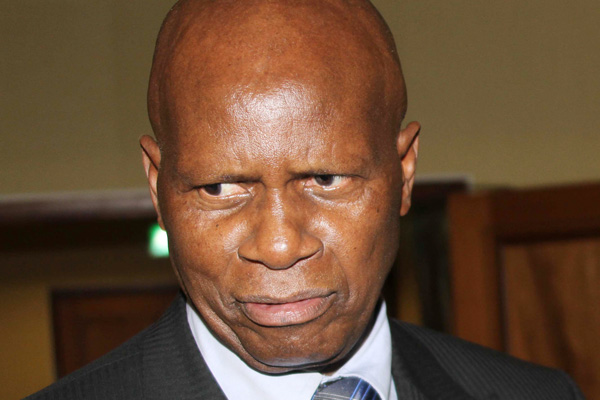
AS the economy continues to implode and paying civil servants on time becomes a mammoth task, Finance minister Patrick Chinamasa and the entire Cabinet should focus their attention more on policy changes to boost investment and on cutting down government expenditure, analysts have said. BY MTHANDAZO NYONI
Zimbabwe is struggling to pay its civil servants on time, resulting in government shifting pay dates time and again citing lack of funds owing to low inflows into Treasury.

The pay date for teachers was moved to December 29, while that of the rest of the public service was moved to January 5.
Analysts say the situation was difficult to handle for Chinamasa as his boss, President Robert Mugabe and the entire cabinet appear clueless on how to revive the economy.
They have urged Mugabe and his team to work together and invest more of their energy on reviving the economy.
“The minister only has tax revenue to work with as borrowing has become impossible. Taxes come from business activity, employment and retail sales, and all of these are down because investment is very low,” said economic analyst John Robertson.
“To boost income, investors need to be encouraged by promises of good treatment that fully recognises and respects property rights, civil rights, the law of contract and the absence of corruption. The minister needs to focus on all of these. If he does and if he makes the needed policy changes, investment will grow, employment will grow and tax revenues will grow.”
- Chamisa under fire over US$120K donation
- Mavhunga puts DeMbare into Chibuku quarterfinals
- Pension funds bet on Cabora Bassa oilfields
- Councils defy govt fire tender directive
Keep Reading
However, such growth would take quite some time, Robertson warned.
Chinamasa has been pragmatic since his move to Treasury in 2013. However, his policies have been scuttled by Mugabe’s populism. When Chinamasa announced a freeze on bonuses until 2017, Mugabe reversed that, saying he was not consulted. The hassles to pay the December salaries appear to vindicate Chinamasa’s position on bonuses.
Former Finance minister Simba Makoni said Chinamasa alone could not do much and there was need for the whole Cabinet — including its captain, Mugabe — to work together.
He said the fact that Zanu PF had killed sources of income like agriculture and mining, made it difficult for Chinamasa to find money for civil servants.
He said Mugabe and his Cabinet should implement policies that enabled economic growth.
Makoni urged Chinamasa to use the little money that is there wisely, especially by developing a productive industry.
“With the little money that he has, he should use it on important things like paying workers, developing road infrastructure and hospitals. He should do things that enable the country to generate income,” he said.
Makoni said the money that was being squandered by Mugabe and his family in the Far East on holiday could have been used to pay civil servants.
The Mugabes are currently holidaying in the Far East at a time the economy is contracting and civil servants have not been paid December salaries.
Makoni said the problem lay on priorities.
“If they can buy [Vice-President] Phelekezela Mphoko a $4 million mansion, they can’t fail to find $4 million to pay civil servants,” he said.
Mugabe’s travels have also come at a cost. In the nine months from January to September, Mugabe spent $33,2 million on foreign travels — nearly double the $17,3 million that had been allocated for this purpose. His office argues that the travels were necessary after Mugabe assumed the chairmanship of Sadc and Africa Union. The Sadc post ended in August while Mugabe’s chairmanship of the AU will end later this month.
Economic analyst and legislator Eddie Cross said Chinamasa should restructure government expenditure as the current structure was unsustainable.
Cross warned that if the expenditure remained the same, Chinamasa would fail to pay civil servants.
According to public policy analyst Butler Tambo, about 92% of the budget revenue is spent on recurrent expenditure, leaving only about 8% for capital expenditure, it being the growth enhancing component of the budget with potential to create future revenue streams. “It is therefore imperative to rationalise the civil service and collapse certain ministries into departments in order to cut on the wage bill from the current 80% to about 40% of the national purse,” he said.
Government has begun processes to reduce the wage bill after it deducted pension contribution from the civil servants on the December salary. Since 2009, civil servants have not been contributing to pensions as government footed the bill.
But Patrick Zhuwao, the Youth minister, insists he will add about 80 000 more people on the government payroll. He wants to recruit youth brigades, who are known to be a Zanu PF political tool usually used to campaign for Zanu PF in elections — often violently.
Tambo said government should improve the ease of doing business through policy consistency, for instance on indigenisation, to improve foreign direct investment inflows.
He said government should expedite the setting up of special economic zones in order to encourage investment inflows into the country.
Under the inclusive government, then Finance minister Tendai Biti introduced a cash budgeting system, arguing that the country had to eat what it produced. This worked as he withstood the pressure by virtue of coming from a political party that wasn’t Zanu PF.











